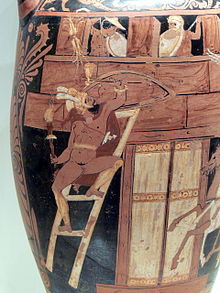
In Greek mythology, Capaneus (/kəˈpæn.juːs/; Ancient Greek: Καπανεύς Kapaneús) was a son of Hipponous and either Astynome (daughter of Talaus)[2] or Laodice (daughter of Iphis),[3] and husband of Evadne, with whom he fathered Sthenelus.[4] Some call his wife Ianeira.[5]
According to the legend, Capaneus had immense strength and body size and was an outstanding warrior. He was also notorious for his arrogance. He stood just at the wall of Thebes during the war of the Seven against Thebes and shouted that Zeus himself could not stop him from invading it. Vegetius refers to him as the first to use ladders in a siege.[6] In Aeschylus, he bears a shield with a man without armour withstanding fire, a torch in hand, which reads 'I will burn the city,' in token of this. While he was mounting the ladder, Zeus struck and killed Capaneus with a thunderbolt, and Evadne threw herself on her husband's funeral pyre and died.[7] His story was told by Aeschylus in his play Seven Against Thebes,[8] by Euripides in his plays The Suppliants and The Phoenician Women,[9] and by the Roman poet Statius.[10]